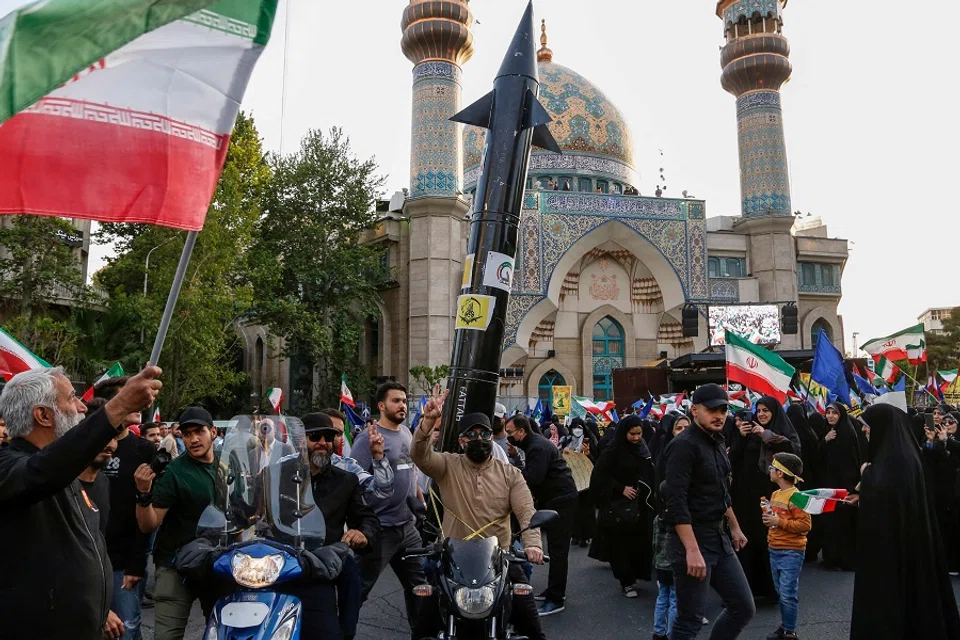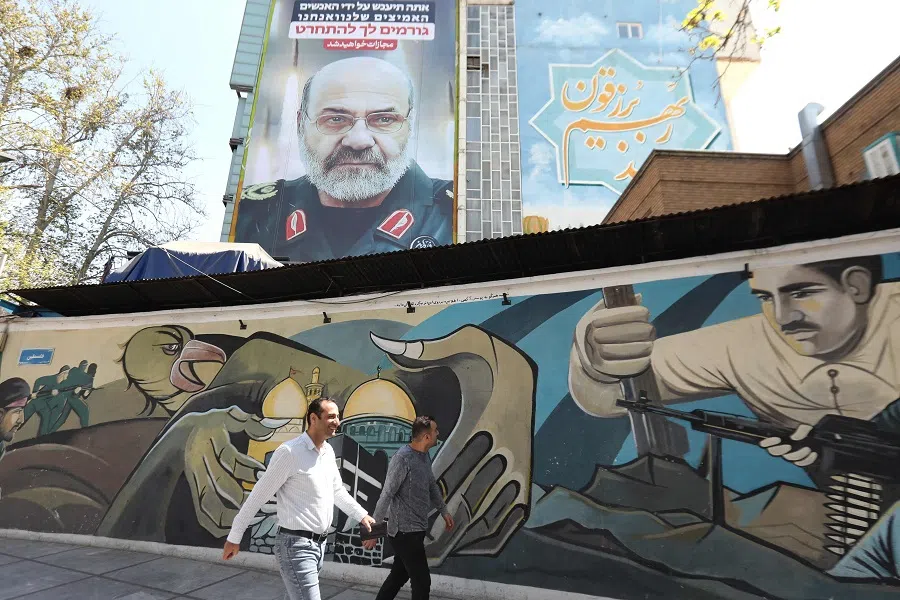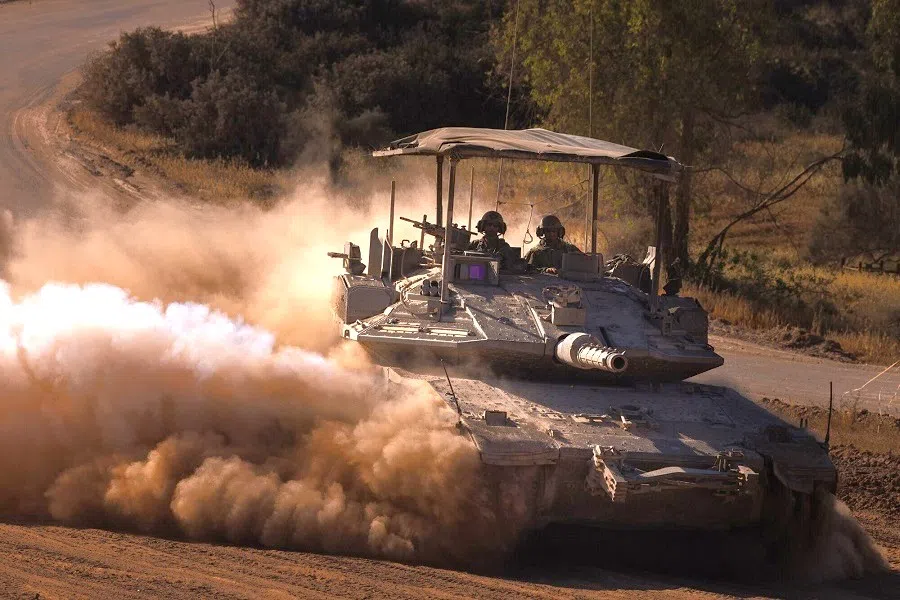Iran's decision to escalate shadow war risks even greater miscalculations
Academic Alessandro Arduino notes the significant escalation and risk of conflict expansion brought about by Iran's latest attack on Israel. If it was hard for China to do more than urge restraint in the past, it would be harder now to do so with Iran's decision to escalate the shadow war.

The ongoing shadow war between Iran and Israel has been brought into the open with Iran launching a direct attack on Israel using over 300 drones, cruise and ballistic missiles. This attack is unprecedented because Iran did not rely on its usual network of proxies like Hezbollah in Lebanon or the Houthis in Yemen.
The strike is retaliation for the Israeli bombardment of the Iranian diplomatic compound in Damascus that killed seven Iranian military commanders, including General Mohammad Reza Zahedi, responsible for the Islamic Revolutionary Guards Corps' operations in Syria and Lebanon. Although Israel has remained silent on its role in the assault on the diplomatic compound, Beijing has condemned the attack as a serious and unacceptable breach of international law.
China keen to de-escalate the situation
Iran's decision to openly attack Israel represents a major shift in the decade-old covert war. While Israel misjudged its assault on the Iranian diplomatic compound, accustomed to targeting Iranian military figures without facing direct retaliation from Tehran, Iran's decision to escalate the shadow war risks even greater miscalculations. Chinese Foreign Minister Wang Yi has reacted by engaging in urgent discussions with counterparts from Iran and Saudi Arabia, affirming Beijing's commitment to forestall any further escalation.
Iranian Foreign Minister Hossein Amir-Abdollahian confirmed in a phone call to Wang Yi that Iran is willing to exercise restraint and has no intention to further escalate the situation. According to the Chinese foreign ministry, during the phone call, Wang noted that the attack was in self-defence, a statement that has been immediately questioned by the Israeli embassy in Beijing.

Leveraging last year's brokered detente between Iran and Saudi Arabia, Wang Yi's discussion with his Saudi counterpart Faisal bin Farhan Al Saud confirmed that both countries aim to prevent any further escalation, to promote an immediate ceasefire in Gaza and to start the implementation of a two-state solution. Following the latest cycle of retaliation, diplomacy is walking on thin ice.
... the financial burden imposed on the defenders is much higher, estimated at around a billion US dollars to counter the attack compared to the Iranian side's expenditure in the range of a hundred million US dollars.
Increasing risk of conflict expansion
The Iranian drone and missile barrage did not cause much damage, partly because Iran had signalled its intentions beforehand, and even airspace from Jordan to Israel was restricted in due time as the drones slowly approached. However, its significance lies not just in the limited damage inflicted but in the broader context, increasing by a notch the risk of a conflict expansion to the Middle East and beyond.
From a tactical perspective, the attack did not pose a significant challenge to Israel's layered aerial defence system, including the Iron Dome and Arrow anti-ballistic missile. However, as is typical with low-cost loitering munitions like the Shahed-136 drone, the financial burden imposed on the defenders is much higher, estimated at around a billion US dollars to counter the attack compared to the Iranian side's expenditure in the range of a hundred million US dollars. This mirrors the economic calculus seen in Russia's actions against Ukraine, employing a similar drone attack strategy on a daily basis.
... the attention generated by Iran's direct assault on Israel offers a convenient diversion.

With the retaliation cycle now in Israel's hands, Prime Minister Netanyahu's government sees an opportunity for a comeback. Facing intense scrutiny for its handling of the war in Gaza, Netanyahu had limited options, but now the attention generated by Iran's direct assault on Israel offers a convenient diversion. This shift not only deflects attention from the plight of Palestinians but also softens criticism against Netanyahu, fostering a sense of national unity amidst internal and international pressures.
Israel's deterrence strategy will likely require a response to establish a precedent for dissuading future Iranian direct operations. Probably, Netanyahu will proceed cautiously with Israel's retaliation, and be mindful not to exceed bounds now that Israel has regained the support of the US and EU.
Even as Beijing continues to emphasise the importance of restraint, the escalating violence between Iran and Israel carries significant consequences, despite China's limited ability to influence the situation. However, the familiar script of calling for restraint persists, echoing previous instances where Europe urged China to use its influence with Moscow to prevent the invasion of Ukraine, or more recently when the US asked China to backchannel with the Houthis to stop the attacks on commercial vessels in the Red Sea.
Will China be able to help keep Iran in check?
China has been vital for Iran's economy amidst renewed US sanctions after the Joint Comprehensive Plan of Action (JCPOA) collapsed under President Trump. Tehran shares China and Russia's vision for a multipolar world, but it is unclear if Iran's more aggressive stance aligns with China's expectations within organisations like the Shanghai Cooperation Organisation (SCO) and the expanded BRICS multilateral forums, both of which Tehran recently joined.
This means that the Middle East race for nuclear weapons is at the door and the diplomatic options are even more limited than in the past.
![Motorists drive their vehicles past a billboard depicting named Iranian ballistic missiles in service, with text in Arabic reading "the honest [person's] promise" and in Persian "Israel is weaker than a spider's web", in Valiasr Square in central Tehran, Iran, on 15 April 2024. (Atta Kenare/AFP)](https://cassette.sphdigital.com.sg/image/thinkchina/1166be2fe648cf760ded9b6f280b88037f8a73c4391265d4e1cb5b775ae8db6e)
In 2015, a joint diplomatic effort that included China, France, Germany, Russia, the UK and the US and Iran managed the JCPOA to ensure that Iran's nuclear programme would be exclusively peaceful in exchange for the lifting of sanctions. The agreement abruptly ended during the Trump administration, but the UN is trying to establish a nuclear-weapon-free zone in the Middle East.
Nevertheless, the recent attack on Israel - in the words of the Iranian president's political deputy, Mohammad Jamshidi, on X - marks that "the era of (Iranian) strategic patience is over'' showing Tehran's appetite for risk and an assertive posture without the need for plausible deniability offered by its proxies. This means that the Middle East race for nuclear weapons is at the door and the diplomatic options are even more limited than in the past.
The heightened risks of miscalculation now extend beyond the prospect of a new front opening in Lebanon to the Middle East's accelerated pursuit of nuclear weapons capabilities. Iran's shift from shadow warfare to overt aggression on 13 April marks a significant escalation. If not well calibrated, Israel's response to the Iranian assault may quell any remaining hope of nuclear weapons non-proliferation in the region, posing unforeseeable consequences not only for China but also for the global community.





